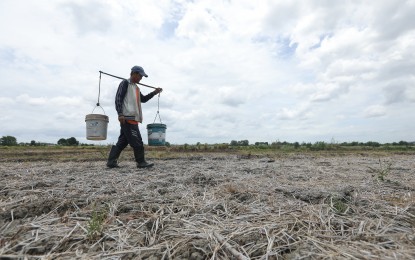
BRACING FOR EL NIÑO. A farmer walks along a dried rice field in Barangay Maname, Naic, Cavite in this May 3, 2023 photo. The government's Task Force El Niño is boosting efforts to mitigate the impact of the phenomenon, which now affects 41 provinces across the country. (PNA file photo by Yancy Lim)
MANILA – The government is ramping up efforts to temper the effects of the El Niño phenomenon, which now affects 41 provinces in the country.
Task Force El Niño chair, Defense Secretary Gilberto C. Teodoro Jr., emphasized the importance of the collective effort of various government agencies in addressing the impacts of drought during the task force's meeting on Monday.
"Secretary Teodoro called on the members of the task force to work closely and ensure coordinated efforts, not just for El Niño but also for other emergency and disaster concerns," the Office of Civil Defense (OCD) said in a statement Monday night.
Teodoro also noted the need to strengthen public information to engage people in preparedness measures.
The Task Force El Niño was reactivated and reconstituted under Executive Order (EO) 53, which took effect on Jan. 19.
Based on the latest assessment of the Philippine Atmospheric, Geophysical and Astronomical Service Administration (PAGASA), the provinces of Batangas, Laguna, Masbate, Oriental Mindoro, Antique, Biliran, Capiz, Cebu, Eastern Samar, Guimaras, Iloilo, Leyte, Negros Oriental, Samar, Lanao del Norte, Sulu and Tawi-Tawi are now experiencing dry condition.
Meanwhile, provinces under a dry spell are Abra, Aurora, Bataan, Isabela, Metropolitan Manila, Occidental Mindoro, Quirino, Rizal, Zambales and Negros Occidental while under drought conditions are Apayao, Benguet, Cagayan, Cavite, Ifugao, Ilocos Norte, Ilocos Sur, Kalinga, La Union, Mountain Province, Nueva Ecija, Nueva Vizcaya, Palawan and Pangasinan.
PAGASA, however, noted that the number of affected provinces is less than the 50 areas recorded based on its Jan. 21 assessment.
Despite the reduction, the task force would reinforce preparedness efforts due to the strong and mature El Niño that is expected to continue this month and is likely to persist until May.
Meanwhile, lead agencies, such as the departments of environment and natural resources (DENR), interior and local government (DILG), energy (DOE), health (DOH), and agriculture (DA), presented situation updates and interventions on the water, public safety, energy, and health sectors, and food security, respectively.
The DENR, the lead on water security, reported that the water supply from dams would be sufficient until May.
Despite this projection, the public is still highly advised to conserve water.
The DENR continues to monitor water supply sources and has been working on the establishment of alternative water sources to prevent shortages.
The DILG, on the other hand, is continuously implementing programs and activities on environmental protection at the community level, law and order, and fire safety.
On energy security, the DOE said interventions to ensure adequate energy supply are continuously being undertaken.
These include the implementation of transmission projects, ensuring the integrity and reliability of the power grid, and enjoining the electric power industry to actively take part in El Niño mitigation efforts.
Meanwhile, the DOH reported that no disease outbreak has been caused by El Niño but the department continuously ensures the readiness of health facilities.
On food security, the DA presented its priority interventions, which include water management, social protection for farmers and fisherfolk, including livelihood support and financial assistance, and price monitoring.
Meanwhile, the Department of Science and Technology (DOST) and the Department of Information and Communications Technology (DICT) will work closely to ensure the effective use of the El Niño online platform.
The platform will be used to provide relevant and timely information to the public to help them plan and respond accordingly to the phenomenon's effects. (PNA)
